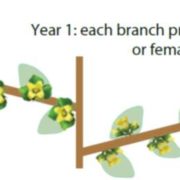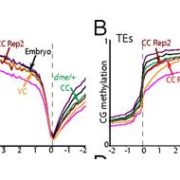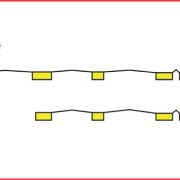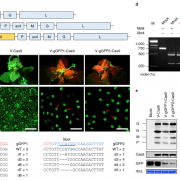MutS-Homolog2 silencing generates tetraploid meiocytes in tomato (Solanum lycopersicum)
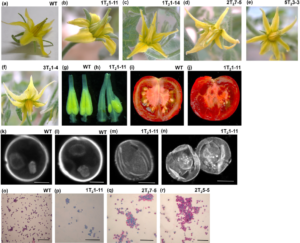 Plant Direct. DNA repair occurs by several independent mechanisms, one of which is the mismatch repair (MMR) pathway. In prokayotes, MutS is a component of the mismatch repair pathway; homologous proteins in eukaryotes are known as MSH (MutS homologs). Sarma et al. set out to develop a hypermutable tomato strain (for genetic screening) by silencing MSH2 through RNAi. Thymine-dimers accumulated in MSH2-silenced lines, demonstrating that DNA repair is hindered. The silenced lines also showed abnormal stamen morphology and decreased fruit set and seed production. Chromosome analysis of the developing pollen revealed an increase in polyploidization as evidenced by tetraploid rather than diploid meiocytes. Root cells in strongly-silenced lines also showed defects in cytokinesis. It remains unclear how MSH2 silencing leads to tetraploidization, but the authors observe that these findings may “contribute to an alternate route to the polyploid formation.” (Summary by Mary Williams) Plant Direct 10.1002/pld3.17
Plant Direct. DNA repair occurs by several independent mechanisms, one of which is the mismatch repair (MMR) pathway. In prokayotes, MutS is a component of the mismatch repair pathway; homologous proteins in eukaryotes are known as MSH (MutS homologs). Sarma et al. set out to develop a hypermutable tomato strain (for genetic screening) by silencing MSH2 through RNAi. Thymine-dimers accumulated in MSH2-silenced lines, demonstrating that DNA repair is hindered. The silenced lines also showed abnormal stamen morphology and decreased fruit set and seed production. Chromosome analysis of the developing pollen revealed an increase in polyploidization as evidenced by tetraploid rather than diploid meiocytes. Root cells in strongly-silenced lines also showed defects in cytokinesis. It remains unclear how MSH2 silencing leads to tetraploidization, but the authors observe that these findings may “contribute to an alternate route to the polyploid formation.” (Summary by Mary Williams) Plant Direct 10.1002/pld3.17



